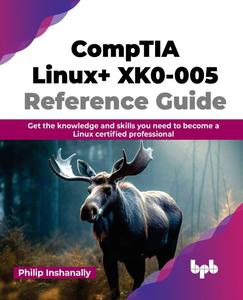
Free Download CompTIA Linux+ XK0-005 Reference Guide: Get the knowledge and skills you need to become a Linux certified professional (English Edition) by Philip Inshanally
English | September 6, 2023 | ISBN: 9355515731 | 406 pages | MOBI | 4.85 Mb
A must-have resource for anyone who wants to pass the CompTIA Linux+ XK0-005 certification exam
Key Features
● Learn the essential skills for troubleshooting Linux systems.
● A study guide that covers all the essential topics in the CompTIA Linux+ XK0-005 certification exam syllabus.
● Challenge yourself with test-like questions to improve your chances of passing the exam.
Description
The CompTIA Linux+ certification is a valuable credential for anyone who wants to work with Linux systems. It demonstrates your skills and knowledge of Linux administration, which is essential for getting a job or advancing your career.
This comprehensive guide is designed to help you prepare for and pass the CompTIA Linux+ XK0-005 certification exam. It covers all the essential topics you need to know, including how to configure, manage, operate, and troubleshoot Linux server environments. It also includes practice test questions to help you assess your knowledge and readiness for the exam.
By the end of this book, you will be confident and prepared to take the CompTIA Linux+ certification exam.
What you will learn
● Learn how to configure network settings, such as IP addresses, DNS servers, and hostnames.
● Get to know the Grand Unified Bootloader (GRUB 2), which is used to boot Linux systems.
● Learn how to manage processes in Linux.
● Learn how to create and run a shell script in Linux.
● Explore and work with configuration management tools like YAML, JSON, and Ansible.
Who this book is for
Whether you are a beginner or an experienced Linux user, this book is the perfect resource for you to pass the CompTIA Linux+ XK0-005 exam and become a certified Linux administrator.
Table of Contents
1. Introduction to Linux Environment
2. Files, Directories, and Storage
3. Processes, Services and Network Configuration
4. Managing Modules and Software
5. User and Password Management
6. Firewall, Remote Access and SELinux
7. Shell Scripting and Containers
8. Configuration Management with YAML, JSON and Ansible
9. Troubleshooting Network and System Issues
10. Mock Exams
